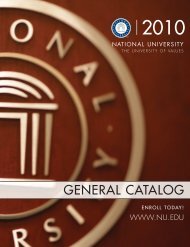Journal of Research in Innovative Teaching - National University
Journal of Research in Innovative Teaching - National University
Journal of Research in Innovative Teaching - National University
You also want an ePaper? Increase the reach of your titles
YUMPU automatically turns print PDFs into web optimized ePapers that Google loves.
they wanted to communicate with their <strong>in</strong>structors and classmates and that their teachers had<br />
motivated them to communicate <strong>in</strong> the L2, thus acquir<strong>in</strong>g high levels <strong>of</strong> pr<strong>of</strong>iciency. Many<br />
participants also identified “self confidence as language learner” as a factor <strong>in</strong>fluenc<strong>in</strong>g their<br />
motivation <strong>in</strong> the L2. These results seem to suggest that the <strong>in</strong>fluence <strong>of</strong> the L2 <strong>in</strong>structor and his<br />
or her methodology is crucial to successful L2 acquisition.<br />
The data from the Likert-scale seemed to support the orig<strong>in</strong>al conclusions from the language<br />
learner autobiographies, as well as the selected literature.<br />
Discussion<br />
Through a comprehensive review <strong>of</strong> past and present literature on L2 motivation, along with data<br />
gathered from four highly pr<strong>of</strong>icient L2 learners, this study identified several motivational and<br />
attitud<strong>in</strong>al factors that seem to lead to high levels <strong>of</strong> fluency. The major f<strong>in</strong>d<strong>in</strong>gs are, as follow:<br />
1. Teachers make a difference <strong>in</strong> L2 motivation. All participants discussed the type <strong>of</strong><br />
teachers they had worked with. Most gave examples <strong>of</strong> positive <strong>in</strong>teraction that had<br />
led to a love <strong>of</strong> the L2 language and culture. Not one participant cited the textbook or<br />
curricular program as hav<strong>in</strong>g a similar positive <strong>in</strong>fluence. This f<strong>in</strong>d<strong>in</strong>g strongly<br />
supports Dornyei & Skehan’s (2003) notion that the way a learner feels about the<br />
learn<strong>in</strong>g environment will highly affect his/her L2 acquisition. Further, the majority<br />
<strong>of</strong> participants described a strong <strong>in</strong>tr<strong>in</strong>sic motivation to learn their L2. This<br />
motivation seemed to be connected to their positive <strong>in</strong>teractions with their L2<br />
teachers and the L2 community. One might conclude that teachers can promote both<br />
an <strong>in</strong>tr<strong>in</strong>sic motivation and an <strong>in</strong>tegrative orientation <strong>in</strong> L2 students that will likely<br />
lead to higher levels <strong>of</strong> pr<strong>of</strong>iciency.<br />
2. Learn<strong>in</strong>g activities are significant and should correspond to the methodological<br />
approach. Participants all discussed the types <strong>of</strong> learn<strong>in</strong>g activities that they<br />
experienced <strong>in</strong> the L2 classroom. Three <strong>of</strong> the four participants described <strong>in</strong>teractive,<br />
engag<strong>in</strong>g activities that motivated them to communicate <strong>in</strong> the L2. The fourth<br />
participant also mentioned the learn<strong>in</strong>g activities as <strong>in</strong>fluenc<strong>in</strong>g motivation, though <strong>in</strong><br />
a negative way. His experience with the grammar-translation approach was, <strong>in</strong> his<br />
words, “a waste <strong>of</strong> time.” Aga<strong>in</strong>, this data supports the review <strong>of</strong> literature, which<br />
concludes that the way a learner views the method <strong>of</strong> <strong>in</strong>struction (either engag<strong>in</strong>g or<br />
<strong>in</strong>effective) will have an <strong>in</strong>fluence on L2 motivation<br />
3. L2 Culture is important. The question <strong>of</strong> culture was a major theme <strong>in</strong> the<br />
autobiographies, but it did not seem to play as <strong>in</strong>fluential a role <strong>in</strong> English as a<br />
Foreign Language (EFL) sett<strong>in</strong>gs, as <strong>in</strong> ESL contexts, though the fourth participant<br />
did emphasize that, <strong>in</strong> Russia, it has always been considered prestigious and<br />
advantageous to speak a foreign language. Thus, culture was a motivational factor.<br />
Nevertheless, more data would need to be collected to further explore the constructs<br />
presented <strong>in</strong> the literature review regard<strong>in</strong>g the key role that culture seems to play <strong>in</strong><br />
L2 motivation.<br />
156

















